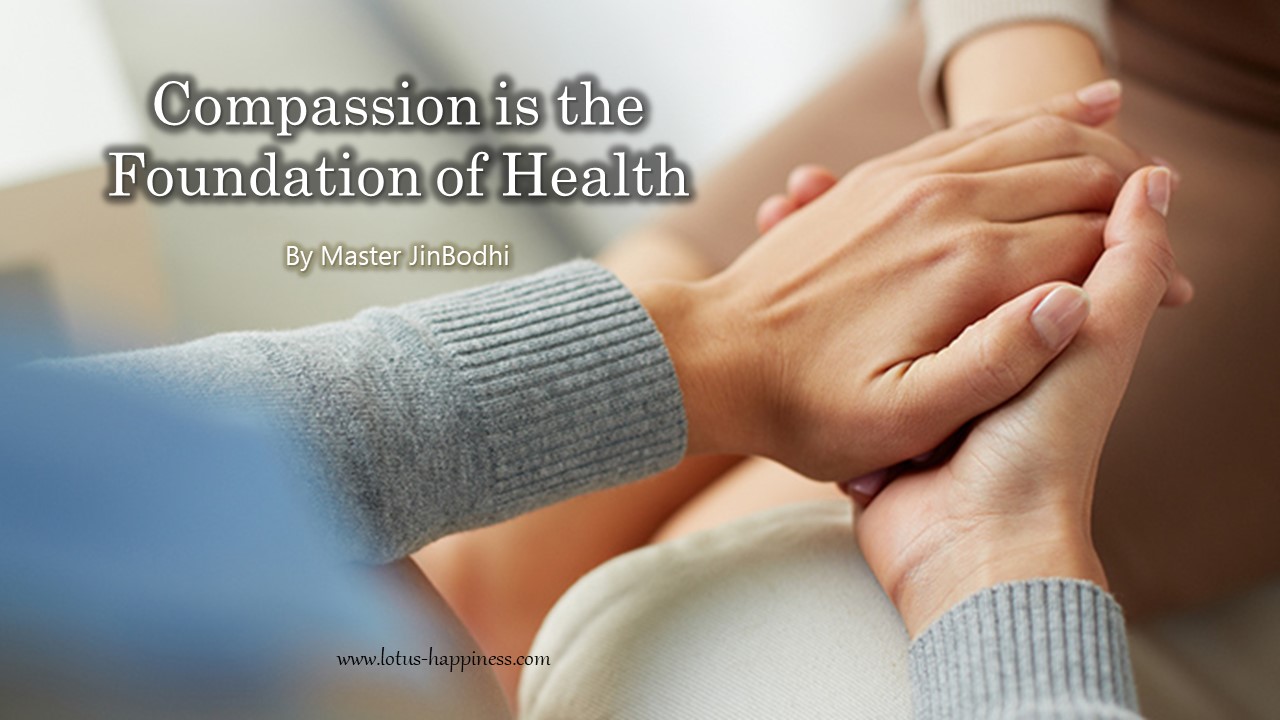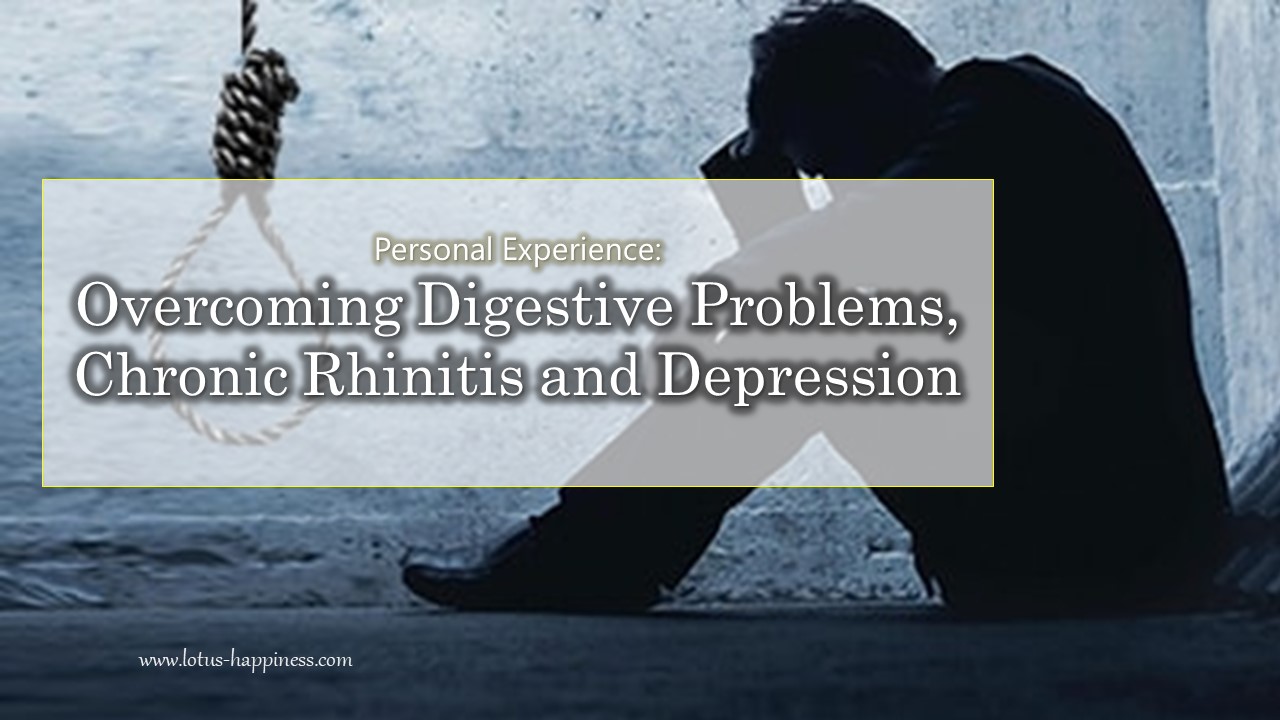Compassion is the Foundation of Health
By Master JinBodhi
We have to learn to be broadminded and have a forgiving, appreciative heart in order to experience the love and beauty of this world and the wonderful people around us. – Master JinBodhi
Many ailments are, at root, psychological problems. They arise from our wrongdoings and lack of wisdom. When we trace the roots of our wayward behaviors and absence of sagacity, we realize that our lack of compassion is the seed.
Most of the illnesses people suffer are caused by acts of lying, cheating, anger, greed, and by our dearth of virtues and compassion. When you are burdened by ill-health, it is time to reflect upon yourself and be awakened with compassion and openheartedness. It is time to show your gratitude to all beings around you and express your love and kindness by focusing on the positive traits of others.
Ingratitude Brings Misery
Someone once said to me, “Master, I’ve heard your teachings about gratitude. However, when I think of my mother-in-law, I just can’t generate a bit of gratitude. Instead, animosity fills my heart.” In this instance, think of yourself being someone’s mother-in-law one day. If animosities arise between yourself and your son or daughter-in-law, you will be living a dreadful life. I remember a woman whose story illustrates my point. Her mother-in-law lived in another city, and she fell ill. As there was no one to look after her, the son wanted his wife to take care of his mother. But the woman lied to her mother-in-law by saying, “Mom, sorry to hear that you are ill. Unfortunately my leg was injured and is now in great pain. I can’t come to take care of you.”
Two months later, this dishonest woman had a bad fall and broke her kneecap. She was bedridden. It was her ingratitude and lack of compassion for others that caused the injury. Some women may even thoughtlessly say, “I married her son, not his mother.” Put yourself in the other person’s shoes: If your husband treated your mother badly, would you remain indifferent? A selfish, jealous or cheating heart lacks compassion. If you regard everyone around you as unpleasant, you are not compassionate either as you fail to appreciate the kindness of others. Perhaps someone has made a mistake, and you choose to focus on it instead of the times in which they helped you. Sadly, we often overlook what others have done for us, narrow-mindedly focusing on a fault. This ungrateful attitude brings us misery.
as you fail to appreciate the kindness of others. Perhaps someone has made a mistake, and you choose to focus on it instead of the times in which they helped you. Sadly, we often overlook what others have done for us, narrow-mindedly focusing on a fault. This ungrateful attitude brings us misery.
Negativities Are the Roots of Ill-Health
The problem of illness is worthy of our attention. Illness, regardless of its causes, is painful. Many diseases have a genetic component, as determined by scientists. For example, a mother has heart disease. When it’s passed to the next generation, it may manifest as rheumatic heart disease. The third generation could need a heart transplant. Hereditary diseases worsen through the generations. Another reason for illness is our karma — our bad deeds — especially if it keeps mounting. Imagine that you are chronically annoyed. After a year of mounting frustration, you may find your anger causes diseases to develop which could eventually lead to death. Accumulated anger is in fact negative energy that could cause blockages in the liver, spleen, heart, or other parts of the body. Over an extended period of time, a tumor might develop.
A benign tumor is not always a serious problem, but a malignant one — cancer — is a challenge for doctors because the malignancy spreads. A tumor can be surgically removed, but it’s hard to remove the roots. The invisible cancer cells may remain in the body. Eliminating illness from its root is the way to achieve health. Cultivating compassion is the way to remove the root of our illnesses.
Understand and Take Action
When we learn something, it is more important that we understand the true meaning, rather than just memorizing the theories. The only way to prove that we understand is when we can put it into action and work it out. For example, we always recite the precept of “no killing.” Then someone may say, “I’ll stop killing once I have achieved enlightenment.” Actually, if you have truly understood this precept, you are enlightened because you will follow it and stop killing. Likewise, if you understand that criticism hurts, you’ll stop using harsh words. If you say, “I’ll stop criticizing when I’ve attained perfect fulfillment,” I bet you’ll never achieve perfect fulfillment.
It’s simple logic, right? What does someone who often scolds others get in return? He gets scolded or even beaten up. I remember there were two young practitioners in our Vancouver Center having a fight. Then they came to me; one boy’s nose was still bleeding. The other boy admitted that he hit him. I commended him for confessing his wrongdoing. However, he went on to say that the incident wasn’t his fault.
I was puzzled. “Not your fault? But you beat him.”
“He called me names.”
The boy with the bleeding nose defended himself.
“It was just gentle name-calling.” I was curious about how name-calling could be gentle.
The injured boy said, “I told him, ‘Even mouse looks better than you.
I was amused and replied, “Luckily, he’s a boy. A girl will show you no mercy when you make unkind comments about her looks.”
The beaten boy retorted, “But he shouldn’t have hit me.” I advised him not to criticize anyone in future; even “gentle” name-calling is not permitted. Provoking others with harsh criticism could result in serious consequences. When you grasp the simple law of cause and effect, you will not do unto others what you don’t want done to you.
The Seed of Compassion Sprouts Good Health
How can we build good relationships with others? Helping or praising someone is one good way to build rapport. The compliments must be sincere, not sarcastic or mocking. Neither should you flatter everyone you meet. The praise should be given out of compassion. We have to learn to be broadminded and have a forgiving, appreciative heart in order to experience the love and beauty of this world and the wonderful people around us.
When gentleness and care start to grow, the area around your heart warms up with energy. As the positive energy intensifies, it dispels negative energy. Your health gradually improves. To be free of sufferings, to attain good health and a pure mind and soul, the key is to cultivate oneself to be a compassionate person. Wisdom develops as the seed of compassion sprouts and blooms, and eventually gains fruition. All these are rooted in compassion.












